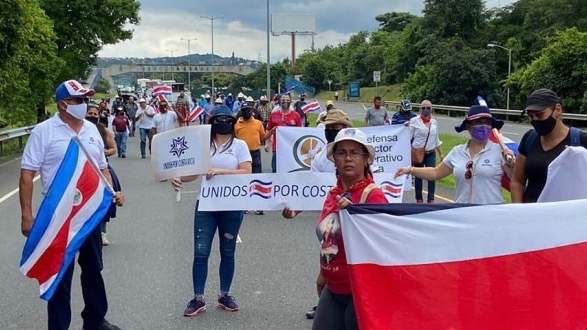Costa Rican social movements and trade unions, grouped in the National Rescue Movement (MRN), are preparing to mobilize against the agreement that the government intends to sign with the International Monetary Fund (IMF) for a 1.75 billion USD loan. On January 18, the leaders and members of the MRN began visiting different regions of the country to organize popular support in rejection of the loan and the neoliberal economic measures that the government seeks to implement to acquire this loan.
In a statement, the MRN said that “Costa Rica does not need any agreement with the International Monetary Fund” and that “there are plenty of alternatives” to deal with the economic crisis facing the country. The organization denounced that the austerity measures the government is planning to impose will “deepen a concentrating and exclusive economic model, which will place Costa Rican society at a delicate point of polarization related to income distribution” as “it hits the key sectors that boost the economy.”
Célimo Guido, one of the leaders of the MRN, told local media that “Costa Rica will return to the streets in the next few days.” Guido stressed on the need to oppose the Public Employment Law bill that the national government seeks to pass. Albino Vargas, secretary general of the National Association of Public and Private Employees (ANEP), also said that the bill is harmful for the working class and will only cause greater social inequality in the country.
Several national trade unions from different sectors denounced that the Public Employment Law is an anti-workers regressive law, which seeks to approve a 12-hours working day, promotes exploitation of workers, rather than the creation of new jobs. The law also gives powers to the government to increase taxes on the working class and sell state institutions such as the Bank of Costa Rica (BCR), the National Insurance Institute (INS), the National Liquor Factory (FANAL), among others.
However, despite the social discontent and rejection, yesterday, on January 18, president Carlos Alvarado asked the Congress to approve the bill. Through a tweet, Alvarado requested the legislators to approve the reform. The head of state said that the law “complies with international standards” and “is key to reducing public spending in the future and addressing the fiscal deficit deepened by the COVID-19 pandemic, and introducing greater justice and wage equality among public servants performing similar functions.”
Last week, on January 11, the government resumed negotiations with the IMF, which were suspended in October 2020 after a wave of protests against the deal. The government has proposed to reduce public spending from 16.45% of GDP in 2020 to 13% in 2025. The government has also agreed to accept the IMF’s conditions to reduce fiscal deficit, increase taxes, introduce new taxes, freeze wages, reduce certain tax exemptions, among other austerity measures.
2.764 MILLONES DÓLARES fue el pago de intereses, ¡sólo intereses!, de la deuda pública el año pasado. Es la deuda pública lo que nos está entrangulando. ¡No son los salarios estatales! El proyecto Ley Marco de Empleo Público no debe aprobarse. ¡Es una verdadera cortina de humo!
— Albino Vargas (@AlbinoVargasB) January 19, 2021





